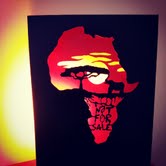The most substantial approach we take on our activities with the West Africa Oil Watch is to first - ask the right questions. There is currently much debate over how to address corruption within each region of prevalence, (Azerbaijan, Ukraine, Russia, China and throughout the Middle East just to name a few..) Each situation carries with it the facets of historically grounded barriers of politically affiliated private motive within a select few whose dissonance from the realities of the common citizen are so divided within their wealth or position within that society that the desire to amalgamate that resource wealth with the commoner is simply non-existent.

This brief 'Three Pillar Approach' is in no way an adequate address to the opaque and arduous circumstances regarding corruption but although the need for transparency is vastly intricate and meticulously complicated to address, there can be a synopsis of three apparent issues to cover:
1.) Adequate representation regarding civil society within the drafting of oil contracts.
2.) Alleviation of the opulence in official positions which hold no immediate liaison with the executive office, (Cabinet 'Aids', 'Energy Ministers', 'Corporate Facilitators', family and tribal tendencies pertaining to resource management administrative power etc..)
3.) Providing Public Documentation of resource revenue wherever it is and to whomever collected and dispersed of it.
Privatization can be a messy business. From water privatization in Bolivia to food monopolies presented by the WHO, WTO and even that of America's debate over ethanol vs. fuel subsidiaries in the production of corn. Fact is - whomever controls the resource wealth, from corn to coltan, controls those who consume it. In this case, I am specifically referring to the corruption of petroleum extraction in West Africa.

Although these regions are unique in their intricate past and current circumstance, what we have found so far is that the need for community representation within the drafting of the oil contracts has never before been such a critical element in alleviating corruption from any private industry. Our approach is strategically aimed at unifying communities for more adequate representation within the drafting of oil contracts throughout the region. Our founder has just returned from Sierra Leone after speaking with civil activists, youth development groups, chiefs and communal civil society organisations to effectively facilitate communication between these groups and strengthen ties within the region to allow for a more substantial presence among affiliated oil agencies. Our agency is new and thus, we lack the funding necessary for providing a community representative, (lawyer) to preside as a direct contact to the people within the region but for now, our activities consist of integrated civil movements such as that formed by Ken Saro Wiwa prior to 1995.

According to Human Rights Watch, "Exxon Mobil, Chevron-Texaco as well as lesser known companies have been spending about $10 billion annually towards exploration of oil in West Africa". Africa is also currently supplying 15% of US Oil Consumption - a figure mind-blowing to gauge in itself as the US consumes 7 Billion barrels of oil per year according to the US Energy Information Administration. As these regions have not the capacity for adequate judicial address to the issues of corruption and poorly lack the parameters of positive law in regions susceptible to political turmoil and relapse into the status-quo that is war within many regions in West Africa, this influx of privatization is incredibly dangerous to a developing economy. The irresponsibility of negligent 'Aids' and corporate liaisons to the area provide a hazardously volatile position for the locals whose fishing communities have been devastated and fraught with crime as 'rebels' attempt to tap the pipelines and export the resource to corrupt third party industries. One example of this issue of fraudulent officials given power of industrial might can be sadly depicted in Liberia's Nobel Peace-Prize Laureate Eileen Johnson Sirleaf's firing of her own son from the position of Central Bank Deputy Governor for failing to report his assets - http://www.bbc.co.uk/news/world-africa-19333908

As Peter Eigen from Transparency International points out in the newly drawn free online document produced by the Governance of Extractive Industries team, (GOXI) entitled "How to Read and Understand an Oil Contract", the current issue regarding resource corruption in West Africa stems from not just the prevalence of direct governmental and corporate ties within the region, (Federal claims of land to privately auction to corporate involvement without consent of the people as can be seen in Nigeria's "Land Use Act of 1978") but seems to stem more predominantly from the grey area of cabinet 'aids' and officials whose position is not so clearly listed. These officials are easily bought off by oil and mineral companies to allocate force behind the decisions of political powers across the region, (Some would argue the world...)

The third point I would make would be the need for addressing adequate documentation for the resource wealth and its flow within government programs and affiliates. Accountancy is vital at this point as our need to document these sources adequately can mean the difference between life and death for the people of these highly impoverished regions. The indoctrination of the Extractive Industries Transparency Initiative (EITI) is a monumental feat for these developing economies as it publicly declares the amount of resource wealth taken from a country and who it has been given to. However, from here, the processes of laundering the money through governmental programs inducing exuberantly excessive spending can dilute the legitimacy of resource wealth as it seeds through the intricate filters of corruption. This is where we have to establish the need for cooperation among the officials of government which must be addressed through direct screening and public documentation of resource funds.
We must address these key points with a strong and persistent attitude that never digresses from our powerfully propelling plight of the people to tackle our issues head on and alleviate corruption in each of its dark and convulsively shallow niches for which it exists.






























